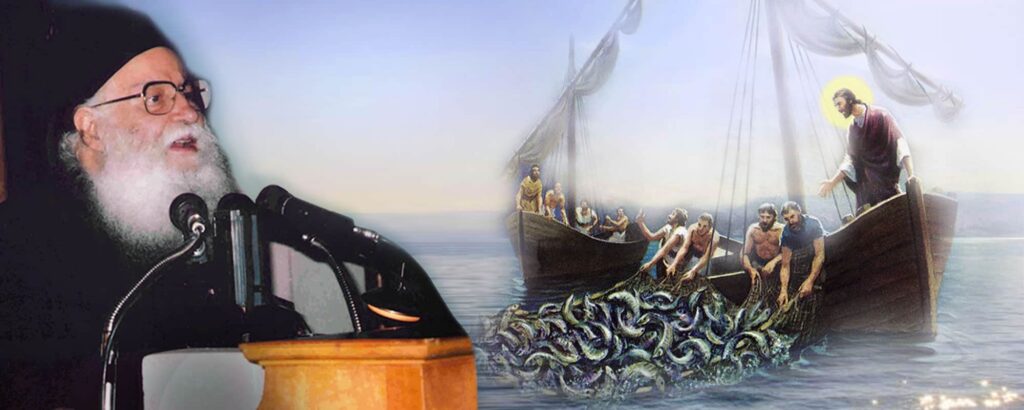
MAKE A BEGINNING
Homily of Blessed Elder Athanasios Mitilinaios
"MAKE A BEGINNING"
On the first Sunday after the Exaltation of the Holy Cross, my beloved, our Church begins to read passages from the Gospel according to St. Luke. Today’s Gospel passage tells us about the beginning of our Lord’s public work and the choosing of His first disciples. Therefore our theme will be the importance of a beginning in any area of our lives, especially in the area of our salvation. Let us look at the Gospel passage and say a couple of words about it to have a better picture.
One morning, on the sandy beach of Lake Gennesaret, the Lord saw two moored boats. Peter with his brother Andrew were in one and James and John his brother were in the other. The Lord asked the Apostle Peter to use his boat for a little while because a great number of people had come to hear Him speak, and since it was not possible for Him to be seen and heard, He asked to speak to the multitude from the boat.
After talking to the crowd, the Lord urged Peter to put the boat into out into the sea to do some fishing. It was midday. Although it was not an opportune time of day to go fishing, Peter obeyed and, shortly after, the net was torn from the great number of fish, so many that they had to call over to James and John to help. Both of the boats were close to sinking from the weight of so many fish. The apostle Peter, like the others, was beside himself; “they were astonished” (5:9) says the Evangelist Luke. And the LORD said to Peter (who was still Simon): “Don’t be afraid. From now on you will be fishing for men; and when they had brought their boats to shore, they left everything and followed Him.” (5:10-11) So we see the Lord making a beginning of preaching the Gospel. Not that very day, but in those days. His first four disciples also began their sacred missionary work, after they “had left everything”. So we sense the spirit of a beginning, the spirit of something starting. ...
The creation of the world also had a beginning. The God-inspired Moses writes: “In the beginning God made the heavens and the earth.” (Gen 1:1). Of course this “in the beginning” means nothing else but time and, consequently, a start, for time did not exist. The very moment God created space and matter, He also created time. He did not create one before the other. And as Origen says: “The name “beginning” can be used even for the beginning of the universe.” 1 I will add, it is a most appropriate name for the creation of the universe, more than any other beginning.
And, as St. Cyril of Jerusalem says (and I digress a little from my main subject because it is a beautiful statement of St. Cyril): “The beginning of the world is water and the beginning of the Good News is the Jordan.”2 Do you see? The beginning of the world is water. The beginning of the Good News, preaching, is the Jordan River. Because after His baptism, the Lord began to preach.This “beginning of the world” he says is “water” (again, allow me a little digression from my main subject, for it is an extremely interesting point). If we read the pre-Socratic philosophers, we will see that each one of them philosophized on the subjects of cosmology and theology, that is, on the world and God. We will also see that each one attributes one element or another as the starting point of creation; one says fire, one says water, etc..
Holy Scripture tells us that the beginning of Creation is water. It makes an impression, because it appears to be a simple substance. Allow me to explain what the Apostle Peter is saying (as I told you, I digress so you can learn a little something). The Apostle Peter, in his Second Epistle says: “the heavens and earth were created of old; by the word of God the earth was formed out of water and by water” (3:5) It is amazing! Pay attention, so that you can understand. The ancient world, they used Holy Scripture with whatever knowledge they had in those days. It was not able, for example, to talk about oxygen and hydrogen. But it is quite obvious that when the Apostle Peter says “it was created out of water and by water”, today we understand very clearly that “water” is hydrogen and oxygen.
We know very well that hydrogen is that which receives the proton in its nucleus, and it makes the elements of the universe. Here, then is the first element, hydrogen, which is contained in water and in a greater amount than oxygen. When we say H2O (two hydrogen and one oxygen), we say it is water - amazing! And then, what forms the surface of the earth? Again, water. The clouds, the waters, the oceans, “from water and by water”. Do you see the precision of Scripture? It is amazing.
All created things have a beginning. Certainly life as a phenomenon had a beginning. By a word from God, the plant and animal kingdoms came into being, and man also (Gen. 1:11-27). Each human being that comes into the world has a beginning, and there is always something fascinating about a beginning, a beauty. Why? Because within it there is hope for the creation and for its success. This is why every man who begins a work fascinates.
The beginning of man is Christ. His beginning, St. Justin says, is in Christ’s will. Christ willed it and He made us. Man owes the beginning of his human form to Christ. Origen says: “Christ is the beginning of those who were made in the image of God.”3 What does this mean? It means that the prototype or archetype was the Logos of God, soon to incarnate, the basis on which man came to be. Jesus Christ, that is, was not made based on Adam. Adam was made based on Jesus Christ.
Therefore, the beginning of man, of existence, the human form, “man”, is not the word spoken by God; he has as a beginning Jesus Christ. Because when we say “Jesus Christ”, we mean the Logos of God become man. And God wills this beginning and every beginning to be good. Just as He is good, whatever He creates is also good. But when God made a beginning in the creation of man, He also made a beginning of man’s freedom. Observe here, because we are entered into an adventure. That is, God left the development of a man’s life up to him: How do you want your life to unfold? I leave you to direct your own life, O man!” This is the mystery of freedom, which is astonishing. My beloved, all my life, from the time I was a teenager, I have studied the subject of freedom and, still, I have not grasped it. So God put life in the hands of man. How? He gave him the authority to make a beginning of his own works. We say: “We will build a house.” We say: “We will have children.” We say: “We will plant a garden.” But now that a man’s life is self-directed, it is also his obligation to make a beginning in his life in all things.
In “Ecclesiastes” it is stated abundantly, “There is a time for everything” (3:1-8), a time to plant, a time to uproot, a time to pull down, a time to build, etc. Indeed, this “a time for everything” here implies that there is a beginning in everything man does. Because when he speaks about moments, he is speaking of time. It also means that, truly, the beginning is in the hands of man, and the first beginning which man must make is to begin his salvation. God also implanted this in Adam. When he told him to work, what did He tell him to work? Paradise which he was enjoying there all prepared? (Gen 1:15) He meant the paradise of his soul. And what fruit was he supposed to bear? (After all, the earth was watered by itself, as the God-inspired Moses tells us.4) What fruit did he have to bear? The fruit of virtues. Consequently, because he was not careful and lost Paradise, he now he has to force himself to make a beginning of his return back to Paradise. He must turn back.
The Gospel of Mark begins as follows: “The beginning of the Gospel of Jesus Christ, Son of God.” (Mk. 1:1) The beginning of the Gospel. What does this say? That this beginning was made by God, in order to help you repent. That is, it enables you, urges you, pushes you to make one more beginning, the beginning of repentance. God makes a beginning to save and you must make a beginning to repent. The Apostle Paul says to the Athenians: “God overlooked the times of ignorance (the days of idol worship, etc.) and now He orders people everywhere to repent (to change their ways, to turn back). (Acts 17:30) We must continually make a beginning of repentance.
The ascetics used to say: “I will make a beginning.”5 It is said of St. Abba Sisoës (July 6) that when he was dying, all of his disciples had gathered around his deathbed. He begged them to leave him alone for a little while so that he could make a beginning of repentance! And as soon as they went away for a little while, he passed away. And he shone with the uncreated light and the place was filled with a sweet fragrance. He had been sanctified, yet he said: “Leave me a for a little while so that I may make a beginning of repentance.” That is what we also must say. We should never say: “I am saved.” No. Make a beginning of repentance, my beloved.
We once began our spiritual life when we were Baptized, but since then we have soiled our baptismal garment. We must make a beginning to cleanse our baptismal garment, and this beginning is to repent and to go to confession. Have we fallen? Begin to stand up straight. Have we fallen again? Begin to correct yourself. Have we fallen again? Whenever we fall, we will get up. Be very attentive to this point. Do not let someone take advantage of it in a cunning and foolish way and say: “It doesn’t matter. I’ll fall again anyhow. I’m going to let myself fall and not be concerned about it anymore.”
Sometimes the pitcher goes down into the well and doesn’t come back up; it breaks. What if death finds you this way? You don’t know. When will you bear fruit then, my brothers and sisters? When? For repentance is not only a word. The act of repenting, says St. John the Baptist, is the fruit. “bear fruit worthy of repentance.” (Lk. 3:8) It is not in our interest to fall, but when we do fall, we can get up; we can repent and get up and begin again. In our inner world also, our sinful thoughts and feelings. We will say, “Leave. Don’t bother me. I am making a beginning of repentance.”
When a man begins his life, the acquisition of virtues is projected upon him. We raise our child and tell him that he must live the virtues we learn about in the Holy Gospel. But they seem difficult to him and there are many of them. What will he do? He will make a beginning. Simple. And the beginning, it is well known, is half the battle. Have you made a beginning? You have done half the work! But the devil knows all too well the value of beginning a work. Therefore, in every undertaking, he plots and schemes in order to frustrate that beginning. He encourages you to think: I can do that later. I know this or that.
He always creates some excuse, some obstacle. He puts negligence in front of a man’s beginning. Spiritual laziness. And negligence, my beloved, I must tell you, is fought with violence. Idleness is what inertia is to mass. As Physics tells us, more energy must be expended for a body at rest to be put in motion. This is what negligence is in our spiritual life. I will tell you a great lesson. Listen here: The beginning of the beginning is violence! We will put violence at the beginning of every work of ours. And this violence is good and necessary. That is why the Lord says, “the kingdom of God is entered violently, and the violent take it by force.” (Mt. 11:12)
The devil also practices another trick. He arrives at the beginning of every work to show us that it is immense and impossible, that it is too great. Am I so great as to fulfill the commandments of the Gospel?
There was a father who sent out his child into the field to plow. So the child went, but when he saw the great expanse of the field he was discouraged and turned back. Fine, his father says to him. So the next morning they went to the field together and the father says to his son, I want you to dig for me right here this many square meters, no more than that, and come home when it is evening. In this way, with this approach, the entire field was plowed.
There is even a beginning when developing a talent. The talent is like gold (the currency of antiquity), raw gold. There must, therefore, be a beginning to refine it. This is indicated where God says, “Open your mouth wide and I will fill it.” (Ps. 80:11) Observe, God will put in the content of His word, but only after I have opened my mouth. And indeed, characteristically, He does not say “open” but He says “widen”; which means that you will work more. When you approach to receive Holy Communion and you open your mouth we the priests say to you: “Open wider.” Wider, as wide as it goes. That is, you will work on your talent as much as possible, and then God will make use of it.
It is the same with a pencil when you begin to write. “What will I write?” you say. Just take the paper and pencil, begin, and you will write. Do you see, the value of a beginning is great for everyone, for the student, for the scientist, for the one who starts his family, for the one who starts a profession—a beginning is very important!
Of course, man can make many beginnings and establish his life, but the most important one is the beginning of holiness. God commands: “Be holy, for I am holy.” (Lev 10:44,45; 1 Pet 1:16) But wanting to become holy does not stop at desiring it. It begins with the little things: beginning to stop little bad habits and beginning to start little good habits. We should also start with willing it. The Apostle Paul says: “Without holiness, no one will be able to see the Lord.” (Heb 12:14) We must, therefore, make a beginning.
Beloved, one morning at Lake Gennesaret, some milestone events happened. The Lord began preaching. He chose His first disciples. He preached repentance as the beginning of our return to God as the way to begin of our new life. He preached and with this wanted to remind us that we too must make a beginning, a beginning in everything, but above all, in holiness.
The Lord divided time into small pieces for our sake in order to help us, like the father who divided the field into small pieces for his child so that he could plow it and not see the great amount of work. He divided it by time, with a sunset and a sunrise. He divided time into years so we can measure the span of our lives: What I did last year, what I’m doing this year, what I can do this year. Moreover, He also divided it into moments, for us to remember the Lord, for us to return to Him and repent continually.
My brothers and sisters, let us make a beginning in everything, and above all, let us make a beginning in repentance and holiness. By making a beginning we complete half of the work, but we will experience all the joy. So let us make a beginning, and the Lord Jesus, who for our sake became a beginning in time with His Incarnation, will surely help us.
Amen.
- Commentary on the Gospel of John 2.4.36
- Catechesis for those to be illumined 3.5
- Commentary on the Gospel of John, Volume I, 1.17.104
- Gen 2:6 “But there went up a mist from the earth and watered all the land.”
- Saint Gregory Palamas: “You should make a beginning of a more perfect life and renew and prepare yourself for the reception of the eternal blessings to come.” (A New Testament Decalogue, Philokalia, Vol. 4)St. Mark the Ascetic: “Everything that happens has a small beginning, and grows the more it is nourished.” (On the Spiritual Law, Two Hundred Texts, #171, Philokalia, Vol. 1)St Diadochos of Photiki: “At the beginning of the struggle, therefore, the holy commandments of God must be fulfilled with a certain forcefulness of will (cf. Matt. 11:12); then the Lord, seeing our intention and labor, will grant us readiness of will and gladness in obeying His purposes. For ‘it is the Lord who makes ready the will’ (Prov. 8:35. LXX), so that we always do what is right joyfully. Then shall we truly feel that ‘it is God who energizes in you both the willing and the doing of His purpose’ (Phil. 2:13).” (On Spiritual Knowledge and Discrimination One Hundred Texts, #93, Vol. 1)“When the heart feels the arrows of the demons with such burning pain that the man under attack suffers as if they were real arrows, then the soul hates the passions violently, for it is just beginning to be purified. It if does not suffer greatly at the shamelessness of sin, it will not be able to rejoice fully in the blessings of righteousness. He who wishes to cleanse his heart should keep it continually aflame through practicing the remembrance of the Lord Jesus.” (On Spiritual Knowledge and Discrimination One Hundred Texts, #97, Vol. 1)
Sources:
- Aktines: September 23, 2018.
- Original homily audio source


